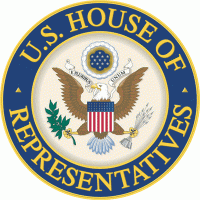Reply to:
Conyers, John (2009) A Reply to Larry Lessig. The Huffington Post. March 6, 2009.

Congressman John Conyers (D. Mich) is probably sincere when he says that his motivation for
his Bill is not to reward contributions from the publishers' anti-OA lobby: He pretty much says up front that his motivation is jurisdictional.
Here are the (
familiar, and oft-rebutted) arguments Rep Conyers refloats, but I think he is raising them less out of conviction that they are right than as a counterweight against the jurisdictional outcome he contests because it is his committee that he feels ought to have decided the outcome of the NIH Public Access Bill. (By the way, the original Bill was anything but secret as it made its way through the House Appropriations Committee, then the House, then the Senate, as Peter Suber's many OA News postings archived along the way will attest.)
Rep. John Conyers:
"[O]pponents [of mandating Open Access to publicly funded research] argue that, in reality, it reverses a long-standing and highly successful copyright policy for federally-funded work and sets a precedent that will have significant negative consequences for scientific research."
(1) Not a Copyright Policy: There is a longstanding federal policy of not allowing federal employees to transfer copyright for research that they do as part of their paid job. It would be quite natural, and no "reversal" at all, to extend this to federal fundees as well.
(2) A Self-Archiving Precondition: But in fact the NIH Public Access Policy does not even do that! It doesn't extend or reverse anything with respect to copyright. It simply requires NIH fundees to make their published articles OA as a (prior) condition of receiving NIH funding, by self-archiving their final drafts free for all online.
(3) Evidence of Positive Consequences: The
actual consequences of self-archiving to date have all been positive ones, for research progress: enhanced visibility, access, uptake, usage, applications and impact for research findings.
(4) No Evidence of Negative Consequences: The "significant negative consequences" to which Mr. Conyers alludes (on the prompting of the publishing lobby) are the hypothetical possibility -- for which there so far exists
no actual evidence whatsoever -- that OA self-archiving will cause subscriptions (largely institutional) to be cancelled catastrophically, making them unsustainable as the means of covering the costs of
peer review.
(5) Subscription Collapse Would Itself Free the Institutional Windfall Savings to Pay for Peer Review: But the
answer to that hypothetical conjecture is that
if and when institutional subscriptions were ever to collapse unsustainably, the costs of peer review would be paid for out of the same institutions' self-same subscription cancellation savings -- per outgoing published article instead of per incoming subscribed journal (and with a lot of money saved all round, for products and services that would no longer need to be provided or paid for if the market for subscription was no longer there, such as the print-on-paper edition and its distribution, as well as the online edition): The
premise of subscription collapse, after all, is that users will prove so satisfied with the final peer-reviewed drafts self-archived worldwide by their authors under global self-archiving mandates, that there will no longer be any market for subscriptions to the publisher's print or PDF version; hence only the peer review itself would be left to pay for out of all the windfall cancellation savings.
(
6) Peer Review Alone Costs Far Less: Nor are those peer-review costs high, since not only do researchers give their papers to publishers for free to sell, but researchers also perform the peer reviewing for publishers for free! So all that's left
in the online age is a competent specialist (editor) to choose the peer-reviewers and to adjudicate the referee reports and revisions to ensure they meet the journal's quality standards, plus software to track referee reports, send reminders, and manage the correspondence with the referees. Once it is found acceptable for publication, the author's final draft is simply certified as having been published by that journal.
Rep. John Conyers:
"These opponents argue that scientific journals expend their own, non-federal resources to manage the peer review process, where experts review academic publications. This process is critical because it provides the quality check against incorrect, reckless, and fraudulent science and furthers the overall quality and vigor of modern scientific debate. Journal publishers organize and pay for peer review with the proceeds they receive from the sale of subscriptions to their journals, thereby adding considerable value to the original manuscripts of research scientists."
All true. But no argument at all against Open Access self-archiving mandates! As long as subscriptions remain sustainable to cover the peer review costs, along with all the other products and services that are currently bundled in with it (producing and distributing the print-on-paper edition as well as the online PDF edition), things continue exactly as they do now (and as they have done for over a decade in the few fields, such as high energy physics, where OA self-archiving has been going on spontaneously at close to 100% levels already with
no detectable effect on subscriptions).
And if ever subscriptions fail, peer review will be paid on the OA publication-fee model that some OA journals such as PLoS and BMC already use today -- but paid for out of the universal windfall cancellation savings, instead of out of extra funds, poached from somewhere else (often scarce research funds themselves!), as now.
In other words, the ominous talk about a threat to peer review is patent nonsense.
Rep. John Conyers:
"The policy Professor Lessig supports, they argue, would limit publishers' ability to charge for subscriptions since the same articles will soon be publicly available for free. If journals begin closing their doors or curtailing peer review, or foist peer review costs on academic authors (who are already pay from their limited budgets printing costs in some cases), the ultimate harm will be to open inquiry and scientific progress may be severe. And the journals most likely to be affected may be non-profit, scientific society based journals."
The reason this is patent nonsense is that it invokes catastrophic subscription cancellations as the threat, but completely ignores the fact that the ones who are saving money on the incoming journal subscription cancellations are the researchers' institutions -- the
very same ones who would then have the money to pay for the (far lower) costs of peer review alone for their own researchers' outgoing articles' peer-review costs, after the hypothetical collapse of subscriptions.
Regardless of whether journals are for-profit or nonprofit, it is clear that research is not an activity that is being funded and conducted in order to provide revenue for those journal publishers! The journals are produced to provide a service to research, researchers, and especially the public who funds the research and for whose benefit the research is being conducted -- a service currently being paid for in full by institutional subscriptions. If and when the only publisher service there is a market left for is peer-review alone, and not the other products and services it is co-bundled with today (and has been ever since Gutenberg), then the peer review will simply be paid for up front, and there will be plenty of saved money out of which to pay for it.

To try instead to keep holding back OA, now that the online medium has made it not only possible, but optimal and inevitable -- and to hold OA back despite its demonstrated direct benefits to research, just in order to indemnify publishers' current subscription revenues and modus operandi against hypothetical risk is rather like trying to keep coal-fed steam engines or horse-drawn carriages in service in order to insure the revenues of stokers and the hay industry -- except it's more like trying to do that with hospital ambulances. (
And that's no less true when it is "Learned Society Publishers' 'Good Works'" that are being invoked as the justification for holding up the ambulance than when it's just commercial publishers' purported greed.)
Reference
Berners-Lee, T., De Roure, D., Harnad, S. and Shadbolt, N. (2005)
Journal publishing and author self-archiving: Peaceful Co-Existence and Fruitful Collaboration.
Stevan Harnad
American Scientist Open Access Forum
 Unfortunately, far too much of what is stated in "coglanglab's"
Unfortunately, far too much of what is stated in "coglanglab's"  Congressman John Conyers (D. Mich) is probably sincere when he says that his motivation for
Congressman John Conyers (D. Mich) is probably sincere when he says that his motivation for  To try instead to keep holding back OA, now that the online medium has made it not only possible, but optimal and inevitable -- and to hold OA back despite its demonstrated direct benefits to research, just in order to indemnify publishers' current subscription revenues and modus operandi against hypothetical risk is rather like trying to keep coal-fed steam engines or horse-drawn carriages in service in order to insure the revenues of stokers and the hay industry -- except it's more like trying to do that with hospital ambulances. (And that's no less true when it is
To try instead to keep holding back OA, now that the online medium has made it not only possible, but optimal and inevitable -- and to hold OA back despite its demonstrated direct benefits to research, just in order to indemnify publishers' current subscription revenues and modus operandi against hypothetical risk is rather like trying to keep coal-fed steam engines or horse-drawn carriages in service in order to insure the revenues of stokers and the hay industry -- except it's more like trying to do that with hospital ambulances. (And that's no less true when it is Harvard Medical School (US* proposed-institutional-mandate)
Harvard Medical School (US* proposed-institutional-mandate)

